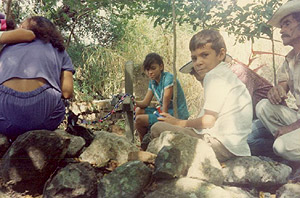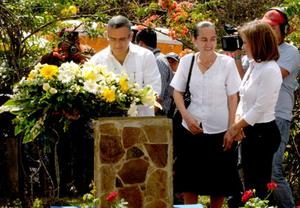Historical Memory
The Missing Link in the Peace Accords and Reagan’s Legacy, February 14 2007
The Missing Link in the Peace Accords and Reagan’s Legacy
Staff
February 14th–Last month marked the 15th anniversary of the Salvadoran Peace Accords signed in Chapultepec, Mexico, ending the armed conflict between the Salvadoran Government and the FMLN guerrillas. In the anniversary of the Peace Accords, many of the players involved in the conflict in El Salvador have been looking back and analyzing where the country stands now, 15 years later. US foreign policy was in large part responsible for financing the conflict, so as many analysts argue which Peace Accords were met and which weren’t, it is also worth examining US foreign policy fifteen years later.
In 1988, still four years before the bloody Salvadoran civil war would end, Ronald Reagan addressed the nation, saying, “I want to begin tonight by telling a story, a true story of courage and hope. It concerns a small nation to our south-El Salvador-and the struggle of its people to throw off years of violence and oppression and live in freedom.”[i] Smack of “Mission Accomplished” and George W. Bush? Well, that hope and freedom Reagan was talking about was being propped up by US taxpayers to the tune of up to a million dollars a day during the eighties in military aid to the Salvadoran Government Elite and death squads, leaving more than 70,000 people dead. Nevertheless, the Administration’s discourse was we were fighting communism and promoting democracy.
Apparently, part of promoting democracy was liberalizing economic policy. Starting toward the end of the war in 1989 with the election of the first ARENA President in El Salvador, Georgetown educated Alfredo Cristiani, the Government began implementing neoliberal economic policies including privatizing the commercial banks. During the rest of the nineties, the Salvadoran government followed a privatization and free trade politics roadmap very similar to the one championed by US President Bill Clinton during the same period. These economic policies caused a mass exodus of poor Salvadorans to the United States in search of a livelihood. The great majority of the one third of the Salvadoran population currently residing in the US left El Salvador after the war, as economic exiles.
Fast forward to today: last month, on the Anniversary of the Peace Accords, Ombudswoman and Salvadoran Attorney General of Human Rights Beatrice de Carrillo highlighted the failure to achieve “two fundamental objectives of the Peace Accords: the democratization of the country and the reunification of the Salvadoran society”. Conversely, Salvadoran President Tony Saca’s Administration chose to celebrate the Anniversary of the Peace Accords as a closed book and urged “forgiving and forgetting.”
But when presented with the evidence, it is hard to forgive and forget. Fifteen years after the armed conflict in El Salvador, hundreds of cases of disappeared persons are still unresolved, in large part because of the General Amnesty Law which was passed immediately after the Peace Accords by the Government parties. The amnesty law freed military officials and politicians from facing criminal charges in the aftermath of the war, and blocked investigating disappearances and war atrocities. In response to the UN´s recent suggestion that El Salvador repeal parts of the Amnesty law, the Chancellor of El Salvador said that by revisiting the General Amnesty Law, we would “mistakenly shatter the peace process achieved so far.” So much for reunification, especially with 500 people per day heading for the US in search of work.
At the same time, on average more people continue to be killed in homicides per day than during much of the war years, making El Salvador the most violent country in Central America. Despite being hailed as a model of democracy, the same ruling party has held power in El Salvador ever since 1989, and has dominated the political scene since the beginning of the armed conflict. Recently, the founder of that party and SOA graduate Roberto D´Abuisson was decorated with honors by the Legislative Assembly. Many also link D´Abuisson to the assassination of Salvadoran Archbishop Oscar Romero and the formation of Salvadoran death squads.
So here’s the snapshot of the stages of US foreign policy and its legacy as El Salvador sees it: the eighties was the decade of death squads and banana republic wars against impending threats (communism), and the nineties was the decade of free trade politics and mass migration, the new millennium threatens a return to the eighties with new threats (terrorism), starting with the same players. Reagan is long gone, but the rest of the gang is still very much in action. Start with Dick Cheney, the George W. Bush VP and coincidentally Secretary of Defense under Bush Senior toward the end of the Salvadoran Armed Conflict. Much has been made of the Cheney remark about El Salvador as a model for building democracy in the war zones of today’s oil republics and terrorist havens: Iraq and Afghanistan (see Mark Engler´s article in Common Dreams). He is right, there are many similarities: death squads linked to local governments receiving exorbitant amounts of US military aid, little regard for human rights, disappearances, torture, countless civilian deaths. All this supported by the US taxpayers and orchestrated by the same circle of CIA elite and CEO´s that we had with Reagan the first time around in the eighties.
But it’s not just Dick Cheney and former Reagan VP and CIA man George Bush’s son running the show in the White House. In December, 2006, former Reagan Assistant and Deputy National Security Adviser to the White House Robert Gates (also CIA) was sworn in as W. Bush’s Secretary of Defense, to surge troops in a conflict escalating toward civil war in Iraq; tens of thousands are already dead. Gates´ new right hand man is former contra runner John Negroponte who served as Reagan’s ambassador to Honduras which he used as a base camp for the CIA intervention in Nicaragua. As Noam Chomsky observes about the current Administration, “I think one can say that the current administration is a selection of the more extremist and arrogant and violent and dangerous elements of the Reagan administration.”[ii]
It looks like we are back to the future in foreign policy and those who run in it the US. Significant, considering the US was the only major player in the Salvadoran civil war that did not have to sign off to any commitments under the Peace Accords. Yet what did we learn in El Salvador? What do we continue to learn in El Salvador?
El Salvador is still paying dearly for the peace brokered when the Reagan-Bush team could no longer convince Congress and US public to fund the civil war supposedly against communism. If Cheney’s Salvadoran model is any indicator, fifteen years down the road when we no longer see images of carnage in Iraq beamed into our living rooms every evening, when the US public’s attention is turned to the next hotspot, and the “No war in Iraq” bumper stickers are fading on our car’s bumper, as the war’s winners continue to divvy up the economic loot and leave little or nothing for the majority, the people of Iraq will still be struggling just as hard as they are today for their basic rights. Just like the people of El Salvador today, it’s a struggle we all face, as the same group of business and CIA elites sweep their sights from communism to terrorism to who knows what next, leaving us to react to their agenda.
So in the Anniversary of the Peace Accords here in El Salvador, models of democracy aside, there was one player who never laid down their arms. That is perhaps the most glaring omission of the Peace Accords, and a challenge for us all.
[i] President Reagan’s address to the nation on February 2, 1988.
[ii] Goodman, Amy. Democracy Now. “Noam Chomsky on Reagan’s Legacy: Bush Has Resurrected “The Most Extremist, Arrogant, Violent and Dangerous Elements” of Reagan’s White House.” Monday June 7th, 2004.




